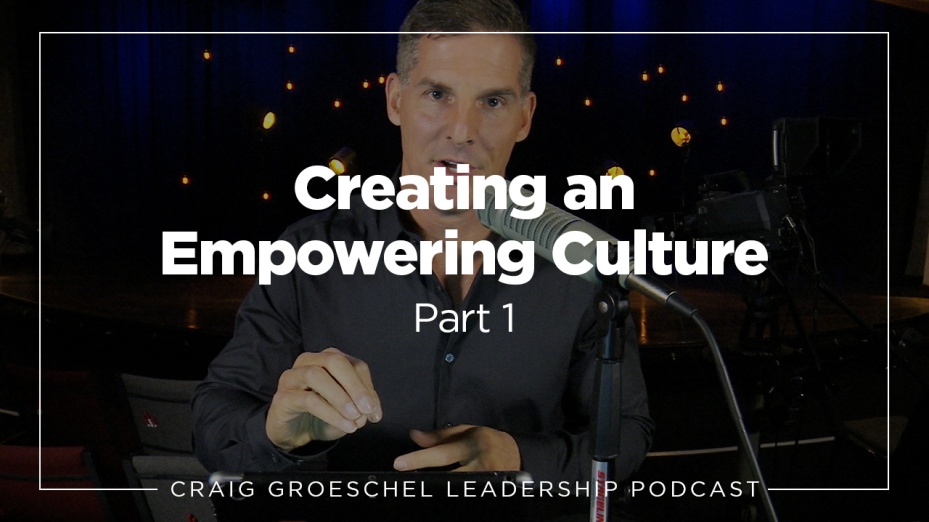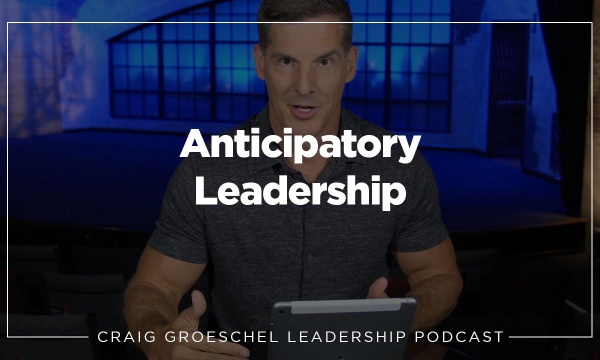Thank you for joining the Craig Groeschel Leadership Podcast! Today, we’ll talk about how empowering your team matters more than you can imagine. You may have a good product, a good strategy, a good plan, and a good vision, but without an empowering culture, your organization will always struggle.
The key to success in any organization is identifying, developing, and empowering the right people.
"Most leaders are trying to figure out the right strategy. The best leaders are obsessed with empowering the right people." —@craiggroeschel Tweet
One of the greatest examples of empowering leadership is Jesus and his disciples. He identified a dozen men who he spent years developing and empowering before telling them, "Go change the world!"
We empower people through clarity and trust. We must be clear on the what and the why, but not the how. Trust those you empower with the how.
"The best way to know if you can trust someone is to just trust them." —@craiggroschel Tweet
Clarity without trust produces fear and inaction. When you have clarity but no trust, you're looking over shoulders and causing fear. You hold onto the things others could be doing instead. Fear can paralyze the people you're trying to lead.
On the other end of the spectrum, trust without clarity produces work without direction. Your team members might be bought in, but they don't know what to do. They'll start doing things that might not be important or right. If you want to frustrate someone, give them freedom without direction.
Clarity ensures that your team members’ work is aligned with your goals and mission. Your team will know that what they are doing matters. Trust is the necessary net that results in risk-taking. When your team members have freedom to fail, they have freedom to experiment and don't have to be perfect.
Next month, we'll talk about guarding your team's values and surrendering control—it’s only possible when you have trust and clarity!
"We don't find great leaders. we build them. Then we empower them and let them lead!" —@craiggroeschel Tweet
Remember, you don’t have to know it all to be a great leader! Be yourself. People would rather follow a leader who is always real than one who is always right.
DISCUSSION QUESTIONS
As a leader, which do you need to improve most: Communicating clearly or extending trust? If it's communicating clearly, make sure you want to know what you want to communicate.
- What's the most important win your organization needs in this season?
If it's extending trust, ask yourself these questions:
- Why am I holding back?
- Are my standards too high?
- Do I really believe I’m the only one who can do things right?
- Am I threatened by good leaders?
- What needs to change in me to better trust my team?
If you don’t trust your team, either you have the wrong team or you are the wrong leader. Either way, it’s your issue to resolve.
LISTENER QUESTIONS
When making big decisions to add or take away programs or departments from your organization, what are some questions you ask yourself? – Robert
Most organizations aren’t doing too little. Most are doing too many things that don’t move the needle. Ask yourself these questions about your programs and departments:
- Are we genuinely passionate about this program or are we faking false energy for it? If you are promoting something you don’t want to do, that's a problem.
- If you weren’t doing this program now, what could you be doing instead? People will give you lots of reasons why you should keep a program or department. (This group likes it. It’s still profitable. Here’s a story of someone’s life that was changed.) These are fair points. Does it have value? Yes. Could you create more value? Maybe? Maybe not.
- If we weren’t doing this program or didn’t have this department, would we start it now?
When you answer these questions, you’ll get some clarity on whether or not to shut down the program or department.
How do we grow our team to get them more involved implementing the ideas we discuss during our meetings? The team already has so much going, they are reluctant to take on new vision. – Natalie
If I’m in this situation, the first question I would ask is, “Do they have too much going?” They might. It's hard to get excited about more when you already have too much. Before starting something new, you might need to stop something old. But, if your team already has the margin and is still reluctant to embrace the new idea, I would ask:
- Do we have a why problem? Before people do the what, they must understand the why. Without the why, the what is hard to get excited about.
- Do we have an ownership problem? If every idea is your idea, your team is simply executing your vision. If they are part of process, your team is more likely to embrace it as their own. I start with myself as the leader. Before I ever give blame, I’m taking ownership. Do I need to motivate better? Does my team have the resources it needs? Do the team members feel valued? Appreciated? Is the culture healthy? If all these are in place and my team is still not driven by vision, I’d look to upgrade the team.
Have a question for Craig? Email him at leadership@life.church.
EPISODE RESOURCES
Leave a Review: www.go2.lc/leadershippodcastitunes
Catalyst One Day: www.catalystconference.com/oneday
Watch Life.Church messages: www.life.church/watch
More from Craig: www.craiggroeschelbooks.com
Free church resources & tools: www.life.church/churches
CONNECT WITH CRAIG
Ask questions: leadership@life.church
Facebook: www.facebook.com/craiggroeschel
Twitter: @craiggroeschel
Instagram: @craiggroeschel
Snapchat: @craiggroeschel
Periscope: @craiggroeschel



